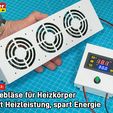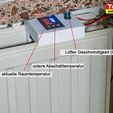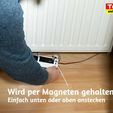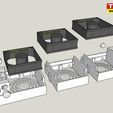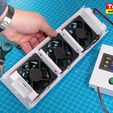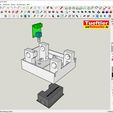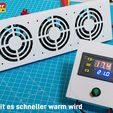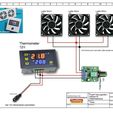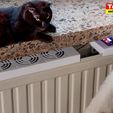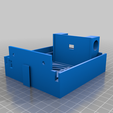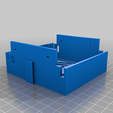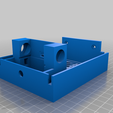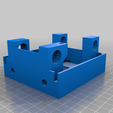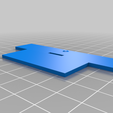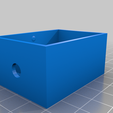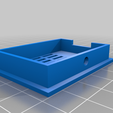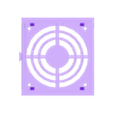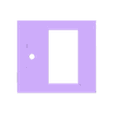Gehäuse für Heizkörperventilator oder auch genannt Heizkörperverstärker bzw. Heizkörper-Booster
STL-Dateien
Projektbeschreibung hier: https://www.tueftler-und-heimwerker.de/heizkoerperventilator-bauanleitung-heizkoerper-booster
Video zum Aufbau: https://www.youtube.com/watch?v=sBl9SSs_FSs
Hier handelt sich um ein Gehäuse für einen Heizkörperventialator für gängige Plattenheizkörper. Der Heizkörperlüfter verfügt über Drehzahlregelung und digitales Thermostat oder Alternativ Temperaturschalter. Bei welchen Plattenheizkörper er genau passt, wird auf der Projektseite und dem dortigem Video beschrieben.
Ein Heizkörperventilator am normalen Heizkörper kann nicht nur helfen, Wohnräume schneller aufzuheizen, er kann sogar helfen, Heizkosten einzusparen. Die Idee ist nicht neu, dass Lüfter bzw. Ventilatoren am Heizkörper durchaus Sinn machen, dürfte sich inzwischen herumgesprochen haben. Es gibt inzwischen ja mehrere kommerzielle Hersteller, die solche Lüfter speziell für Heizkörper anbieten.
Hier wird oft sogar mit bis zu 25% Energieeinsparung geworben. Leider sind kommerzielle Lösungen nicht immer ganz billig, daher bringe ich euch hier eine Bauanleitung mit 3D Modellen, dadurch wird der Bau zum Kinderspiel.
Video: Video zum Aufbau: https://www.youtube.com/watch?v=sBl9SSs_FSs
Der Bau eines Heizkörperlüfters ist relativ einfach und selbst für Laien kein Problem. Die Basis unseres Heizkörperventilators sind sechs kleine leise PC-Lüfter (80 mm), die man sehr preiswert im Online-Handel bestellen kann, die Bezugsquellen aller verwendeten Teile findet ihr in meiner Projektbeschreibung: https://www.tueftler-und-heimwerker.de/heizkoerperventilator-bauanleitung-heizkoerper-booster
Damit das Ganze auch ein wenig ordentlich aussieht und damit man es wahlweise auf oder unter dem Heizkörper montieren kann, habe ich das Gehäuse mit dem CAD-Programm Sketchup gezeichnet und mit einem 3D-Drucker ausgedruckt. Wenn ihr das Ganze also nachbauen wollt, solltet diese Dateien als einfach herunterladen.
Dieser Download enthält alle STL- Dateien die für den Bau erforderlich sind. Wer sich auch für die Original CAD Sketchup-Dateien, interessiert um Änderungen vorzunehmen der kann auch diese auf unserer Projektseite in einem anderen Download finden. Dazu solltet ihr euch aber ein wenig mit Sketchup auskennen.
Die Druckfläche eures 3D-Druckers muss nicht sehr groß sein, da ich das Lüfter-Gehäuse modulartig entworfen habe. Je nachdem wie viel Lüfter ihr kombinieren wollt, könnt ihr mehrere Teile zusammenstecken und so 2er, 3er, 4er oder 5er-Lüfter Reihen aufbauen. Empfehlen würde ich pro Heizkörper im Schnitt zwei 3er-Reihen.
Materiallisten, Tipps zur Verkabelung und zum Zusammenbau des Projektes aber auch zum Ausdruck des Gehäuses auf der Projektseite: https://www.tueftler-und-heimwerker.de/heizkoerperventilator-bauanleitung-heizkoerper-booster
Die wichtigsten Teile sind:
Für den Ausdruck verwende ich PETG das ideal für diese Aufgabe war weißes PETG
https://www.tueftler-und-heimwerker.de/product/petg-filament-in-weiss/
Ich verwende 0,3mm Layerhöhe ohne Stützstruktur bei min. 30% Füllung für den Druck.
Jegliche Gewährleistung ist ausgeschlossen. Weitere Projekte und Elektronik Tipps/3D-Modelle/Zeichnungen auf https://www.tueftler-und-heimwerker.de/tag/3d-drucker/
ENGLISCH
Housing for radiator fan or also called Radiator amplifier or radiator booster
Project description here: https://www.tueftler-und-heimwerker.de/heizkoerperventilator-bauanleitung-heizkoerper-booster
Video of the assembly: https://www.youtube.com/watch?v=sBl9SSs_FSs
This is a housing for a radiator ventilator for aisle panel radiators.The radiator ventilator has speed control and a digital thermostat or alternatively a temperature switch The exact panel radiator for which it is suitable is described on the project page and in the video there. A radiator fan on a normal radiator can not only help to heat living spaces more quickly, it can even help to save heating costs. The idea is not new, and the fact that fans or ventilators on radiators makes perfect sense has probably got around by now. There are now several commercial manufacturers who offer such fans specifically for radiators.
They often even advertise energy savings of up to 25%. Unfortunately, commercial solutions are are not always cheap, so I am bringing you a construction manual with 3D models, which makes construction is child's play.
Video: Construction video: https://www.youtube.com/watch?v=sBl9SSs_FSs
Building a radiator fan is relatively simple and no problem even for non-professionals. Our radiator fan is based on six small, quiet PC fans (80 mm), which can be ordered very inexpensively from online retailers.can be found in my project description: https://www.tueftler-und-heimwerker.de/heizkoerperventilator-bauanleitung-heizkoerper-booster
To make the whole thing look a bit tidy and so that it can be mounted either on or under the radiator, I drew the housing with the CAD program Sketchup and printed it out with a 3D printer. So if you want to recreate the whole thing, you should simply download these files.
This download contains all the STL files required for the construction. If you are also interested in the original CAD Sketchup files to make changes you can also find them on our project page in another download. However, you should be a little familiar with Sketchup.
The print area of your 3D printer does not need to be very large, as I have designed the fan housing in a modular way.Depending on how many fans you want to combine, you can put several parts together and create build up rows of 2, 3, 4 or 5 fans. I would recommend an average of two rows of 3 per radiator.
Material lists, tips on wiring and assembling the project, but also on printing the housing
on the project page: https://www.tueftler-und-heimwerker.de/heizkoerperventilator-bauanleitung-heizkoerper-booster

/https://fbi.cults3d.com/uploaders/16238929/illustration-file/55173c5b-7cbe-4a0c-b76e-4b17552f35f7/d2af1edb-abe8-47b4-92c0-f0b81fef6aa5.jpg)
